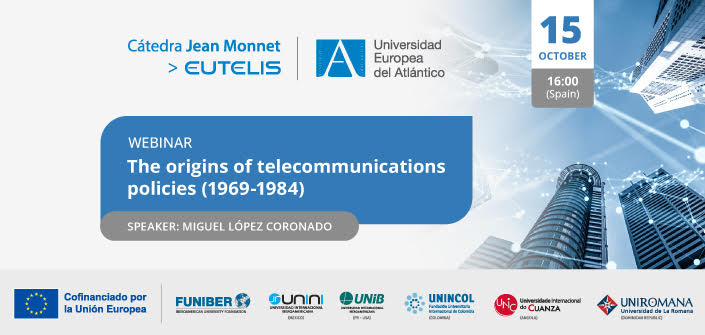The European University of the Atlantic (UNEATLANTICO) will organize, next October 15 at 16:00 hours (GMT+2), the webinar “The origins of telecommunications policies (1969-1984)”.
The session will be given by Miguel López Coronado and is part of the Jean Monnet Chair “Telecommunications Policy in the EU and the Information Society” that the European University of the Atlantic (UNEATLANTICO) holds and that faces this 2024/2025 its last academic year.
The single market, a fundamental objective of the Treaty of the European Economic Community, would promote the development of a standardization policy in the telecommunications sector that would be established in parallel to the commitments of the General Agreement on Tariffs and Trade (GATT) of 1979, created to promote international trade and eliminate technical barriers.
The event also has the collaboration of the Universidad Internacional Iberoamericana de Puerto Rico (UNIB), the Universidad Internacional Iberoamericana de México (UNINI México), the Fundación Universitaria Internacional de Colombia (UNINCOL), the Universidade Internacional do Cuanza ( UNIC) and the Universidad de La Romana (UNIROMANA).
The conference is free and open to all those interested in the subject, and will be broadcast live on FUNIBER’s YouTube channel. Broadcasting schedules can be consulted at this link. To participate, it is necessary to register:
Registration to the webinar “The origins of telecommunications policies (1969-1984)”.
If you are interested in receiving the full training of the Chair, you will find more information at this link. Students in the program must complete practical sessions focused on gamification and mobile application design to receive their accreditation.
The objectives of the Jean Monnet Chairs, which are specialized teaching positions in European Union studies for university professors and associate professors, are to: improve the teaching of EU studies through specialized programs; conduct; monitor and supervise research on EU-related topics at all levels of education; train and mentor the next generation of teachers and researchers; and provide qualified guidance to future professionals in European affairs.

“Funded by the European Union. However, the opinions expressed are the sole responsibility of the author(s) and do not necessarily reflect the views of the European Union or the European Education and Culture Executive Agency (EACEA). Neither the European Union nor the granting authority can be held responsible for them.”


